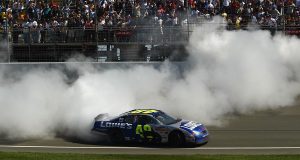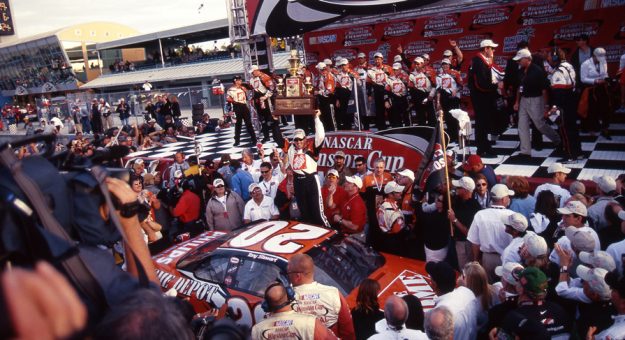Editor’s Note: NASCAR is celebrating its 75th anniversary. SPEED SPORT was founded in 1934 and was already on its way to becoming America’s Motorsports Authority when NASCAR was formed. As a result, we will bring you Part 55 of a 75-part series on the history NASCAR.
The 2002 NASCAR Cup Series season will long be remembered as one of the most competitive in history.
In the end, the No. 20 Joe Gibbs Racing team, led by fiery and controversial driver Tony Stewart, claimed the championship by a mere 38 points, slightly more than one point per race.
Stewart won three races en route to winning the championship, but posted 15 top-five and 21 top-10 finishes during a season where there was no one dominant team or driver. There were 18 different race winners during the 36-race season, and with seven races remaining, an amazing nine drivers were still within 201 points of the lead.
At that time, Stewart ranked third in points and rookie Jimmie Johnson held the lead. Stewart’s Home Depot team, led by crew chief Greg Zipadelli, simply had fewer problems down the stretch than the other contenders.
Mark Martin battled Stewart to the end, and despite a hlghly publicized 25-point penalty levied by NASCAR when his Ford was found to carry an unapproved spring at Rockingham in the third-from-last race, he came up 38 points short in the end.
Stewart became the first driver to have won both the Indy Racing League and NASCAR Cup Series championships. Stewart took the IRL title in 1997, and was the first driver to win all three United States Auto Club titles (midget, sprint car, Silver Crown) in the same season back in 1995.
Martin won just once during the season, but finished in the top 10 22 times in his first season working with crew chief Ben Leslie. Interestingly, Leslie and Jimmy Fenning, who had been Mark Martin’s crew chief for many years, traded jobs within the Roush Racing organization during the off season.
The four-car Roush Racing operation indeed enjoyed more success than any of the other operations, with young chargers Matt Kenseth and Kurt Busch enjoying breakthrough seasons.
Kenseth led the circuit in victories, with five triumphs, but was not flashy in the process. His De-Walt Tools team, led by crew chief Robbie Reiser, used outstanding pit work to put itself in position to win on several occasions, and Kenseth’s patient style kept his No. 17 in contention through most of the year.
Unfortunately, Kenseth had several engine failures during the course of the year and wound up eighth in the standings.
Fenning, meanwhile, called the shots for Busch, who in his second season of Cup Series racing, won four races, including three of the final five, wheeling Roush’s Rubbermaid Ford. Busch’s season-ending tear took him from 12th in the standings with 10 races remaining, to third in the final tally, only 159 markers behind Stewart
However, all wasn’t rosy for the Roush organization, as Jeff Burton, who had been the team’s leader in recent years, and entered the season as a favorite for the championship, finished 12th in the standings and did not win a race. The team replaced longtime crew chief Frankie Stoddard with Paul Andrews during the final third of the season.
Four-time and defending champion Jeff Gordon endured one of the more difficult campaigns of his career.
He endured the longest losing streak of his career, starting 61-straight races without a victory. Gordon ended that streak with a victory at Bristol Motor Speedway in August when he punted Rusty Wallace out of the way late in the race to take the lead. Ironically, Wallace’s streak of 16-straight seasons during which he won at least one race, ended.
Gordon added two more victories and was in the thick of the title race in October. However, his team stumbled down the stretch, and he ended up fourth in the standings. Wallace, while he didn’t win a race, posted 17 top-10 finishes and wound up seventh in the standings.
The race for rookie of the year may have been more interesting than the battle for the championship. Ryan Newman claimed the honor after a season-long duel with Jimmie Johnson, who finished seven points ahead of Newman in the series standings.

Johnson came home fifth in points, with Newman sixth. Newman, however posted more rookie points than Johnson as only the top 17 finishes count. Newman, who drove for Penske Racing South as a teammate to Wallace, registered 22 top-10 finishes and 14 top fives, while winning one points race and The Winston All-Star race. Newman also led the series in poles, with six.
Johnson on the other hand, got most of the press as he won three races and was in the race for the championship throughout the season. Driving for Hendrick Motorsports as a teammate to Gordon, Johnson posted 21 top-10 finishes, but only six in the top five.
Stewart and all of the other competitors may have caught a break when Sterling Marlin was injured in a crash at Kansas Speedway in late September. Driving Chip Ganassi’s Coors Light Dodge, Marlin took the point lead after the second race of the season at Rockingham, and held the point through three victories until giving it up to Martin after the 27th race of the season at New Hampshire Motor Speedway.
While Marlin endured several difficult races in a row, he was still only 121 points behind at the time of his neck injury.
Ganassi put rookie Jamie McMurray, who will drive for the team next season, in Marlin’s car; and the driver dazzled the world by winning in only his second start, at Charlotte Motor Speedway in October. Newman, Johnson, Busch and McMurray were not the only first-time winners on the trail.
After 226 starts, Johnny Benson earned his first Cup Series victory in November at Rockingham.
Stewart’s teammate, Bobby Labonte, suffered through a dismal season in which he won just once and finished 16th in points.
Meanwhile, Robert Yates Racing teammates Dale Jarrett and Ricky Rudd finished ninth and 10th in points, with Jarrett winning twice and Rudd once. Rudd left the team at the end of the year and will drive for the Wood Brothers next season, with Elliott Sadler filling his seat at Robert Yates Racing.
Dale Earnhardt Jr. won a pair of races, both at Talladega Superspeedway, while his teammate Michael Waltrip won his second Cup Series race in the Pepsi 400 at Daytona. Earnhardt and Waltrip wound up 13th and 14th, respectively, in the standings.
Ward Burton, meanwhile, opened the season by winning the Daytona 500. However, his Bill Davis Racing team struggled the rest of the way and he finished 25th in points.
Ford won the manufacturer’s championship for the 15th time and the third in the last five sea-sons. Stewart’s championship was the second for Pontiac in three years.
